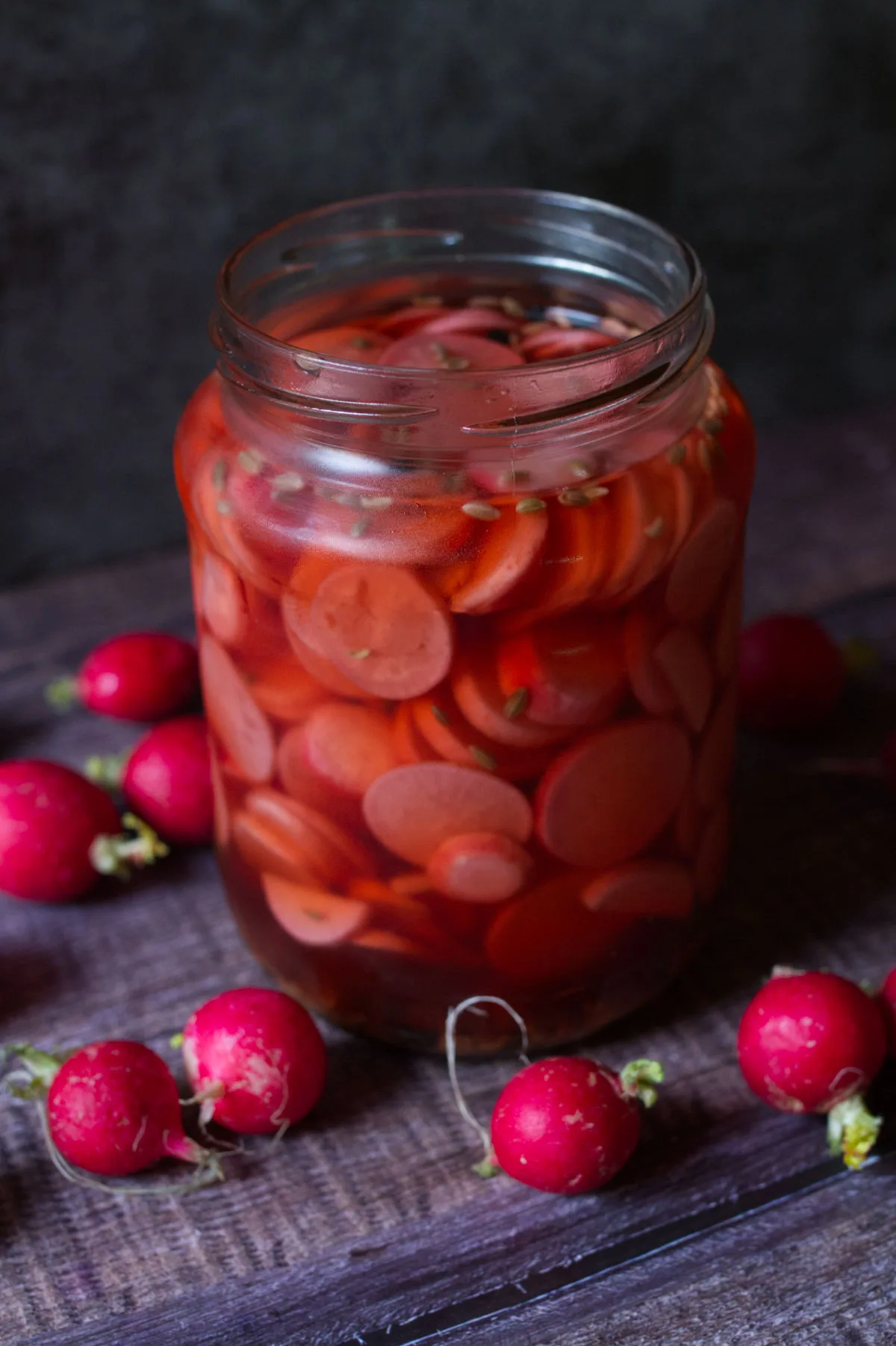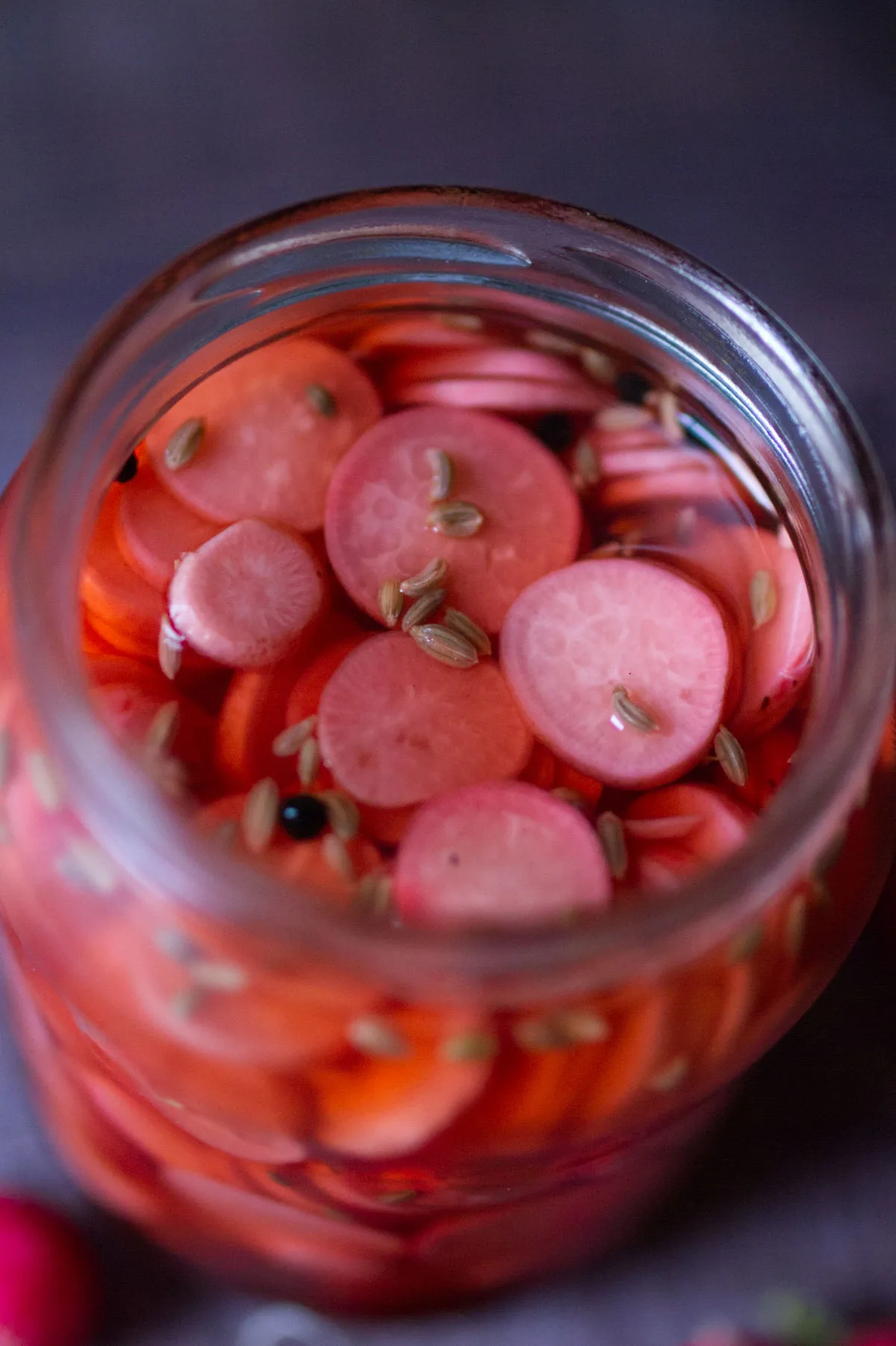Pickled Radishes
Quick and Delicious | Easy to Make

Elevate your salad game with delicious tangy pickled radishes. They’re tasty and have a fantastic crunch and a vibrant pink color! Pickled radishes are versatile and can be used to add pop to any salad recipe or side dish. Sprinkle them over your favorite summer recipe for an instant burst of color and freshness, or use them as a garnish to add zing to any main meal recipe!
The beauty of making pickled radishes is it’s just so easy: Simply slice your radishes, heat the brine, season with your favorite seeds or herbs, and refrigerate! That’s it!
This post may contain affiliate links.
Serving:
350 g / 12 oz.
Ready in:
1 hour, 10 minutes
Skill level:
Easy
Serve with:
Salads, mains

What is the Pickling Process in Food?
Pickling food is a preservation technique that involves immersing food items in a solution containing vinegar, salt, sugar, and various spices or herbs. This process creates an acidic environment that inhibits the growth of bacteria, yeasts, and molds, thus extending the shelf life of the food.
Pickling works particularly well on various types of veggies and has been a preservation technique for perishable foods for centuries. In ancient times, pickling was a crucial method for preserving food, particularly during times of scarcity or for long journeys where fresh food was not readily available. The process of pickling allowed people to store fruits, vegetables, and meats for extended periods, thus ensuring a stable food supply.
Nowadays, pickling of vegetables and other perishable foods remains popular and you’ll find no shortage of pickled goods in your local supermarket.
The Pickling Process
Here’s a basic overview of the pickling process for food:
- Preparation: Wash and prepare the food items you want to pickle. This could include vegetables like cucumbers (for pickles), carrots, onions, radishes or beets.
- Brining: Many pickling recipes involve soaking the food items in a brine solution. This brine typically consists of water, vinegar, salt, and sometimes sugar. The food is left to soak in the brine for a certain period, which can vary depending on the recipe and the type of food being pickled.
- Flavoring: Additional flavorings such as spices, herbs, garlic, or onions can be added to the brine to enhance the taste of the pickled food. Common spices used in pickling include mustard seeds, dill seeds, peppercorns, and bay leaves.
- Sterilization and Packaging: Once the food items have soaked in the brine and absorbed the flavors, they are usually packed into sterilized jars or containers. The jars are then sealed to prevent contamination. Some recipes may require additional processing, such as heat sterilization through water bath canning or pressure canning, to ensure long-term preservation.
- Maturation: After the pickling process is complete, the flavors of the food will continue to develop over time. Many pickled foods benefit from a period of maturation, during which they are stored in a cool, dark place for several days or weeks before being consumed.
Pickled foods are enjoyed for their tangy flavor, crisp texture, and versatility. They can be served as a condiment, added to sandwiches or salads, or enjoyed as a snack on their own. The pickling process not only preserves the food but also enhances its taste and adds depth of flavor through the infusion of spices and herbs.
Watch step-by-step recipe video
If you’re looking for this recipe’s video and many other great recipe ideas, why not check out our Spanish Radish YouTube Channel? We’ve got everything from quick and easy tapas recipes to delicious main meals, to incredible Spanish dessert options too.
How to Make Pickled Radishes
Ingredients
- 2 cups red radishes (around 250g 8.8oz.)
- 1 cup white vinegar
- 1 cup water
- 2½ tablespoons brown sugar
- 1 heaped teaspoon salt (we used pink Himalayan salt)
- 1 teaspoon whole black peppercorns
- ½ teaspoon fennel seeds (or any other seed or herb you like)
Equipment
- 1 large sterilized jar with a lid (around 500ml – 16 fl. oz. is an ideal size)
- Colander
- Sharp knife and cutting board
- 10-inch skillet or frying pan
- Spatula
Instructions
- Heat the vinegar, water, sugar, and salt in a medium saucepan over medium heat. Stir until the sugar and salt dissolve, about 1-2 minutes, depending on what type of sugar you use.
- Add all the radishes to a colander and rinse under fresh water.
- Remove stalks and tails from the radishes then thinly slice the radishes into rounds or half moons (the thinner the better).
- Add flavoring (we added whole black peppercorns and fennel seeds, but up to you!)
- Pour the brine over the radishes, then stir in the peppercorns and fennel seeds. Let the jar cool to the touch then label it with the date pickled and chill in the refrigerator.
- Pickled radish slices will be ready to eat in a few hours, although their flavor and color will intensify if left overnight.
Cooking Notes:
- Pickled radishes are ready in about an hour of putting them in the fridge, but for best results (and the brightest colors) leave them a full 24 hours before serving.
- Pickled radishes will last up to 2 weeks when refrigerated in an airtight container or jar.
- Avoid using any radishes with blemishes or bruising on the skin.
Cooking Tips:
If you want to roast your own peppers:
- Preheat the grill to high. Cut the peppers in half and place them cut-side down on a nonstick baking sheet.
- Avoid using parchment paper as it may catch fire under the grill.
- Grill the peppers for 15-20 minutes until they blister and soften.
- While peppers are still hot, transfer them into a plastic bag and leave them to sweat for 5 minutes.
- Once peppers are cool to the touch, remove them from the bag and gently rub and the skin should fall off.

Why Do Radishes Turn Pink After Pickling?
One of the best things about pickled radishes is their color. They turn a light pink color which is great for adding some vibrance to your summer salad arsenal.
The pink coloration that occurs in pickled radishes is primarily due to the presence of pigments called anthocyanins. Anthocyanins are natural plant compounds that belong to the class of flavonoids, which are responsible for the red, purple, or blue colors found in many fruits, vegetables, and flowers.
In radishes, certain varieties contain anthocyanin pigments in their skins (not all radishes turn pink with pickling so look for the small radishes with pink skin). The trick is to use the small reddish pink colored radishes, not the long carrot-size white radishes.
Add Flavoring with Spices, Seeds, and Herbs
Pickled radishes taste great on their own, but why stop the party there? Add some herbs such as dill, coriander, or a few bay leaves to your pickled veg to give them some extra flavor.
We added a small amount of fennel seeds (½ teaspoon) and some whole peppercorns (1 teaspoon) to our pickled radishes. The fennel seeds give a subtle yet distinctive anise flavor and the whole black peppercorns release a little warmth without overpowering the sweetness of the pickled radishes.
When adding seeds or peppercorns, aim to serve the fennel seeds with them removed, and cracked black pepper is not recommended as it is gritty to the taste.
What type of sugar should I use for pickling?
We use brown sugar for pickling. It’s also common to use granulated sugar, which dissolves easily and evenly into the pickling liquid. You can use either white granulated sugar, light brown sugar, or cane sugar, depending on your preference and the flavor profile you want to achieve.
Some recipes may also call for other sweeteners like honey or maple syrup for a different taste, however, we find no sweetener is required for pickled radishes as they have a fantastic sweet flavor with just a little brown sugar added (we used 2½ tablespoons of brown sugar).
Are Pickled Radishes Healthy?
Radishes are low in calories but rich in nutrients like fiber, vitamin C, and various minerals. Pickling them can preserve these nutrients while adding flavor. However, it’s essential to watch out for the sodium content in pickled radishes, as excessive sodium intake can be detrimental to health.
Best Salt to Use for Pickling
For this recipe, we use 1 heaped teaspoon of Pink Himalayan salt. It is important to use good-quality salt when pickling vegetables. Table salt is not recommended. Here are a few reasons why it is best to use sea salt:
- Processing: Sea salt or good quality pink Himalayan salt is typically less processed than table salt. Sea salt is produced by evaporating seawater, while table salt is mined from salt deposits and often undergoes refining to remove impurities and additives.
- Trace minerals: Sea salt may contain trace minerals like magnesium, potassium, and calcium, which can contribute to its slightly different flavor and color compared to table salt. However, these minerals are present in very small amounts and are not significant contributors to overall nutrition.
It is important to consider that pickled radishes and other pickled vegetables should be considered as a garnish to any meal, adding flavor, color, and texture.
Enjoy pickled radishes in moderation as part of a balanced diet for a tasty and nutritious addition to your meals.
Nutrition Facts
|
Serving size: 10g |
|
|
Servings: 20 |
|
|
Amount per serving |
|
|
Calories |
6 |
|
% Daily Value* |
|
|
Total Fat 0g |
0% |
|
Saturated Fat 0g |
0% |
|
Cholesterol 0mg |
0% |
|
Sodium 24mg |
1% |
|
Total Carbohydrate 0.9g |
0% |
|
Dietary Fiber 0.2g |
1% |
|
Total Sugars 0.7g |
|
|
Protein 0.1g |
|
|
Vitamin D 0mcg |
0% |
|
Calcium 4mg |
0% |
|
Iron 0mg |
0% |
|
Potassium 31mg |
1% |
|
*The % Daily Value (DV) tells you how much a nutrient in a food serving contributes to a daily diet. 2,000 calorie a day is used for general nutrition advice. |
|


Pickled Radishes | Quick and Delicious | Easy to Make
Equipment
- 1 large sterilized jar with a lid (around 500ml - 16 fl. oz. is an ideal size)
- colander
- Sharp knife and cutting board
- 10-inch skillet or frying pan
- Spatula
Ingredients
- 2 cups red radishes around 250g 8.8oz.
- 1 cup white vinegar
- 1 cup water
- 2½ tablespoons brown sugar
- 1 heaped teaspoon salt we used pink Himalayan salt
- 1 teaspoon whole black peppercorns
- ½ teaspoon fennel seeds or any other seed or herb you like
Instructions
- Heat the vinegar, water, sugar, and salt in a medium saucepan over medium heat. Stir until the sugar and salt dissolve, about 1-2 minutes, depending on what type of sugar you use.1 cup white vinegar, 1 cup water, 2½ tablespoons brown sugar, 1 heaped teaspoon salt
- Add all the radishes to a colander and rinse under fresh water.2 cups red radishes
- Remove stalks and tails from the radishes then thinly slice the radishes into rounds or half moons (the thinner the better).
- Add flavoring (we added whole black peppercorns and fennel seeds, but up to you!)1 teaspoon whole black peppercorns, ½ teaspoon fennel seeds
- Pour the brine over the radishes, then stir in the peppercorns and fennel seeds. Let the jar cool to the touch then label it with the date pickled and chill in the refrigerator.
- Pickled radish slices will be ready to eat in a few hours, although their flavor and color will intensify if left overnight.
Video
Notes
Cooking Notes:
- Pickled radishes are ready in about an hour of putting them in the fridge, but for best results (and the brightest colors) leave them a full 24 hours before serving.
- Pickled radishes will last up to 2 weeks when refrigerated in an airtight container or jar.
- Avoid using any radishes with blemishes or bruising on the skin.
Love this recipe?
Leave us a comment and tell us your favorite Spanish tapas recipe!

0 Comments